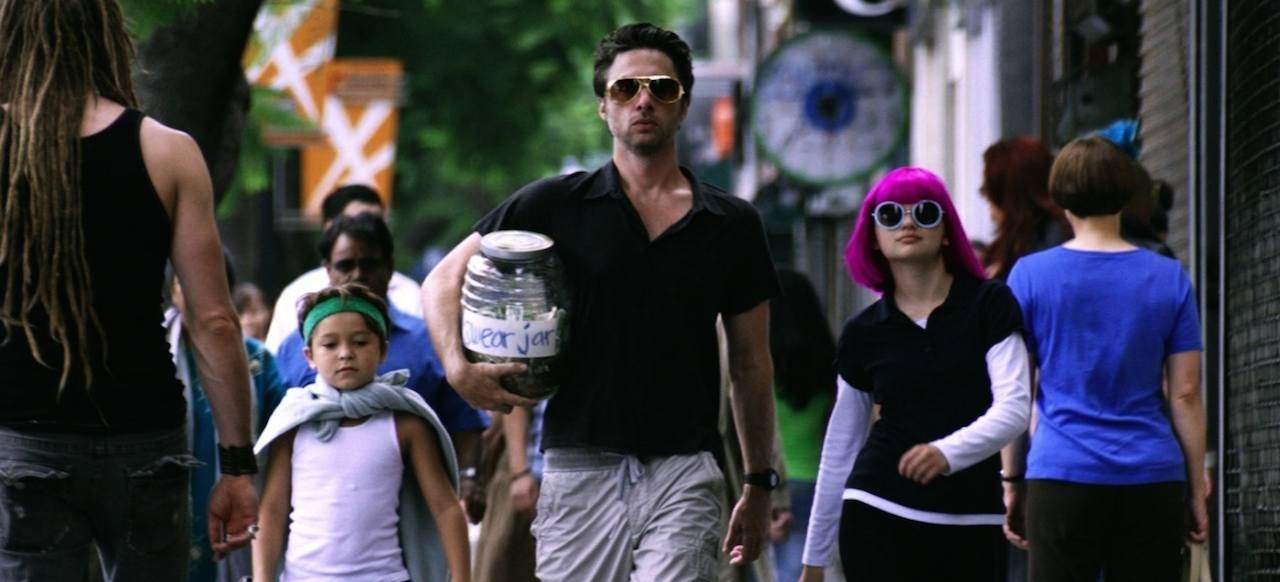Wish I Was Here
The director of Garden State moves on from the problems of rich white actors in their 20s to examine the problems faced by rich white actors in their 30s.
Overview
It's extraordinary that with only one film to his name, Zach Braff's directorial style became instantly recognisable. Perhaps because it was so influential, his popular 2004 film Garden State quickly became the shorthand for a certain type of independent film with a checklist of insta-clichés: a manic pixie dreamgirl who rouses a sullen lead out of his ennui; droll metaphorical imagery (a shirt that looks just like the wallpaper!); profundity in the mundane (a big hole in the ground that represents in the infinite abyss!); a carefully considered collection of melodic indie songs on the soundtrack (The Shins! Coldplay! The Shins!).
It's odd that with such a big success under his belt, Braff took ten years to make his follow-up. Difficult second album syndrome? Perhaps. But in doing so, Garden State has calcified in our shared cinematic memory as a sub-genre unto itself; for Braff's second film to have any chance at all, it would have to shake off all the tropes that are now synonymous with his name and do something drastically different.
It does not. In fact, aside from the fact that Braff is now looking at the problems faced by rich white actors in their 30s (as opposed to rich white actors in their 20s), his new film Wish I Was Here plays like a biting parody of Zach Braff. All the hallmarks of Garden State are present, and what should, in a more just world, be considered an authorial style, now feels like a failed attempt to recapture a movement and a mood that expired years ago.
Much has been made of the fact that Braff turned to crowdfunding to raise the budget that he could have so easily raised with a studio; famously, he feared interference from the suits and wanted to make his own vision. Perhaps some interference might have been a good thing. But this path is only galling in light of the journey of Wish I Was Here's characters: wealthy people who need slightly more money asking for charity. This is hardly an exaggeration.
The film's story — which I'm now only getting to at the tail end of the review — follows a failed actor who is still trying to follow his dreams despite the fact that he has responsibilities to his family. His father, stricken with cancer, needs to pay for his own treatment, and so can no longer pay for his grandchildren's expensive religious education. This is the inciting incident that's meant to inspire sympathy, but the stakes are so low and so unrelatable to the average moviegoer, that the film is crippled from the outset. It's so poorly judged, few changes would be needed to turn it into an all-out pastiche; Not Another Zach Braff Movie, if you will.
Both Braff's character and his on-screen brother (Josh Gad) are manchildren who essentially learn that the women in their lives will continue to support them so long as they persist in their manchildish ways. The "lessons" learned at the end feel superfluous and unaffecting, despite what the last shot tries to tell us. The brother's storyline is the most baffling, and possibly the worst idea in a film full of poor choices.
I wanted to like this film. I really did. For all that it now represents, I still hold a soft spot for Garden State, and I like Braff as both an on-screen performer and a filmmaker. As a director, he has a keen eye; it just failed him horribly here.





